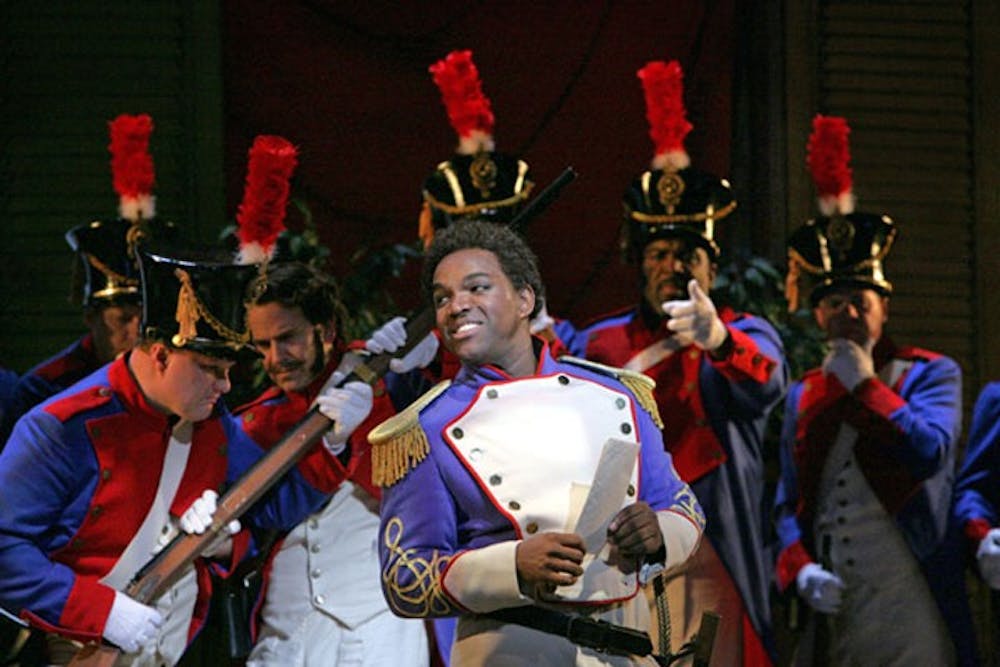The stereotypical stuffiness of an opera was nowhere to be found in the Washington National Opera’s production of “The Barber of Seville” on Wednesday, Sept. 16.
The production of Gioachino Rossini’s classic comic opera benefited greatly from its accessible humor and excellent singing of the entire cast. Director David Gately’s treatment of the opera “takes its cue from Rossini himself, who was all for having fun,” according to the playbill.
Rossini’s “Barber” tells the story of the barber Figaro who, for the right amount of gold, agrees to help the handsome and rich Count Almaviva win the hand of the beautiful Rosina. Unfortunately, Rosina’s guardian Doctor Bartolo wants to marry her to gain her dowry. Bartolo is aided by Don Basilio, who doles out counsel while stealing everything he can fit in his pockets.
Almaviva disguises himself as the poor Lindoro in order to win Rosina’s hand in marriage not for money, but for love. After many misadventures, including a run-in with the police, Almaviva is able to marry Rosina and reveal himself as the rich count he is. This leaves Bartolo with nothing to do but sit back and accept Rosina’s dowry as a consolation. In the end, each of the characters ends up with what makes them happiest: love, money and sometimes both.
Lawrence Brownlee and Silvia Tro Santafé made their WNO debut as the two lovers brought together by fate and Figaro. Brownlee’s tenor voice suited Almaviva perfectly with the role’s difficult runs sounding effortless yet strong. Mezzo-soprano Tro Santafé’s Rosina commanded the stage with her impressive range, flowing runs and beautiful high notes. Both Brownlee and Tro Santafé played their characters as the fools love had made them well.
Simone Alberghini played Figaro with just the right amount of smugness to keep the character likeable. In this production, Figaro has the ability to bring the lights up with a snap and the power to move amongst the characters while they are frozen, sometimes placing items in their hands or contorting their positions. Alberghini’s bravado and commanding stage presence made this seem believable.
While the singing gave life to the production, the comedy gave it a smile. The humor has the potential to become hackneyed, but overall it added to the levity and fun of the production. In the first act, Count Almaviva is almost struck with the contents of a chamber pot by Berta, the maid, while standing underneath Rosina’s window. This may seem juvenile, but in performance it was simply funny.
One of the most successful scenes in “Barber” was the finale of the first act when the police have just arrived after a fight between Almaviva, disguised as a soldier, and Bartolo. The scene was done mostly in slow motion, providing the entire cast and chorus with an opportunity to showcase their comedic skills. One soldier steals a bottle of wine and begins to celebrate while Don Basilio tries to stuff a sword in his pocket. Chaos ensues with hilarious results. These humorous moments gave the opera the lighthearted treatment it needed to engage the widest range of audience members.
“The Barber of Seville” has found its way into popular culture through the aria “Largo al factotum” and its famous line, “Figaro, Figaro, Figaro!” It also doesn’t hurt that the opera’s overture was performed by Bugs Bunny and Elmer Fudd in the classic 1950 cartoon, “The Rabbit of Seville.”
Tickets that cost up to $250 can make going to the opera impossible for most college students. Free membership in WNO’s “Generation O” program can solve that problem. For selected operas during the season, WNO offers discounted tickets for opera-goers between the ages of 18 and 35.
“The Barber of Seville” closed Sunday, Sept. 19. WNO’s next opera, Giuseppe Verdi’s “Falstaff,” opens Oct. 10 and runs through Oct. 30.
You can reach this writer at thescene@theeagleonline.com.





